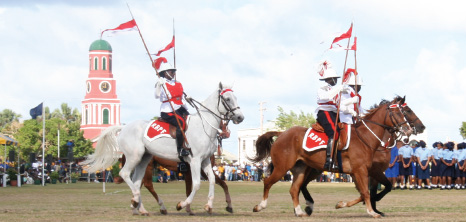|
The Royal Barbados Police ForceThe primary duty of The Royal Barbados Police Force (RBPF) is to enforce law on the island of Barbados. The RBPF is divided into three territorial divisions, the Operations Support Division, the Administrative Support Division and the Criminal Investigations Division.
Early Existence of the Royal Barbados Police ForceThe early life of the Force was characterized by rigid discipline and the military bearing of its members.
Undoubtedly, this was as it should be if the new Force was to adequately meet the threat against law and order which prevailed in the society. This was against a background of events which culminated a year earlier, 1834, and is now considered the greatest landmark in our history, notwithstanding that of Independence.
Francis Mayal Mallalieu was to set up and manage a Police Force which was to ensure that Barbados became secure and law abiding. To do this, the senior ranks had to be filled by officers appointed from England through the Colonial Office, while the other ranks were selected from among the inhabitants who could not aspire above the rank of Sergeant-Major. As a consequence, it can be easily accepted that the recruitment of suitable policemen was no easy, although the nucleus of the early men, it is believed, came from among those who served in the Bridgetown and Rural Police.
The Headquarters was established at Central Station which was to serve the country parishes. A number of guards were therefore established under the command of Corporals and lance-Corporals while the stations were under the command of Sergeants or Lance-Sergeants.
The Guards were the "off-shoots" of Central Police Station and were found necessary in the early days because of the lack of sufficient mobility.
They were located within Bridgetown and its environs in order to provide efficiency in response to reports. The Guards were known as Central Station, then referred to as the Main Guard, Tudor Street, Market, Roebuck Street, Bridge, Bay and Hastings Guards. These Guards were relieved daily at 5:30 a.m.
Each Guard had its own peculiar duties while those of central Station, Bridge, Tudor Street and Market Guard were charged with additional duties.
The Non-commissioned Officer of the Main Guard received the rations allocated to prisoners and issued them at 8:00 a.m. and 2:15 p.m. Any food that was not consumed by the prisoners in an hour and a half after being delivered was taken away. The Guard was in charge of the keys of the Arrest room and of those under arrest.
The Corporal at Bridge Guard was required to caution persons bathing near the sewage pipes of the General Hospital that is was dangerous to do so.
The Tudor Street Corporal would ensure that no person enter or leave Central Station by the Tudor Street Gate which was kept locked. The key of the gate was handed to the In-door Sergeant by the Corporal of the Tudor Street Guard at 6:00 p.m. daily. The In-door Sergeant giving it to the Corporal of the Guard at Guard-Mounting Parade the following morning.
The Market Guard frequently visited the beach in the vicinity of Fontabelle, especially on Sundays and Bank Holidays to see that no nuisances were being committed. He would lock the front gate of the market every evening at 10:00 p.m., the key being kept hung in a conspicuous place in the Guard room. On the alarm of fire he would open the gate without delay.
Sentries were to take charge of their posts and all public property entrusted to their care walking about in a brisk and smart manner carrying their arms at a slope. They would present arms to the governor, Inspector General of Police, all Officers of the Army and Navy entitled to such, as well as armed parties and funerals.
They would shoulder arms to the Inspector General, Colonial Secretary, Legislative Council Members and those of the House of Assembly, Police Magistrates and all unarmed parties.
They were expected to challenge all persons approaching their posts between 10:00 p.m. and 5:00 a.m. call out the Hour and "All's Well" every half hour between 10:00 p.m. and 5:00 a.m. When there was a fire they would blow their whistles until attention was attracted.
They were responsible for ensuring that no persons loitered about the yards of Police stations, and that all Non-Commissioned Officers or men quitting the stations were properly dressed. Bundles could not be taken out of the barracks until their contents were examined by the In-door Sergeant at Central Station and the Sergeant in charge of District stations. They were to report any unusual occurrences to the Non-Commissioned Officer in charge of the guard and acquaint themselves with the names and appearances of men confined to barracks.
On prisoners being brought to the stations, they would allow no one to enter the Station except the person making the charge or those prepared to bail the prisoner.
In addition, they used to call out relief at 8:45, 1:45, 2:45 and 5:45 by day and by night, including the men detailed for duty at Government House.
As communication and mobility improved in the Force, there was a gradual closure of the guards. Roebuck Street and Tudor Street Guards were about the first to go, while the status of some guards was raised to police post or later to a full station.
Eagle Hall post later became Black Rock Police Station. Hastings Guard survived as a station, the Bridge Guard became a station and later amalgamated with the Harbour to be administered as one station, the Bridge and Harbour Station. Meanwhile it was suggested that on amalgamation, the new station should be known as "Southside Police Station", because of the responsibility for policing the area of Bridgetown south of the Careenage. However, this suggestion was not accepted. The Roebuck Street guard gave way to the Belmont post and a station was later sited at Britons Hill. Both of these were closed during the 1960s. Meanwhile, there are still police posts at Crab Hill, St. Lucy and at the Grantley Adams International Airport.
The only remaining Guard is to be found at Government House. Email Contact InformationPress and Community Relations - pubrelation@rbpf.gov.bb The Office of Professional Responsibilities - profresponse@rbpf.gov.bb The Office of Professional Responsibilities - research@rbpf.gov.bb Crime Intelligence - crimitell@rbpf.gov.bb
Further information on the Royal Barbados Police Force can be sourced from their website at http://www.barbadospolice.gov.bb or by contacting them at the following numbers: Emergency: 211, Hotline: (246) 429-8787 or PBX (246) 430-7100.
|



